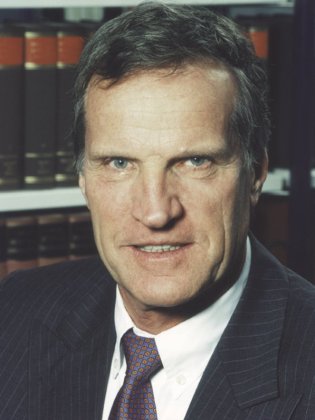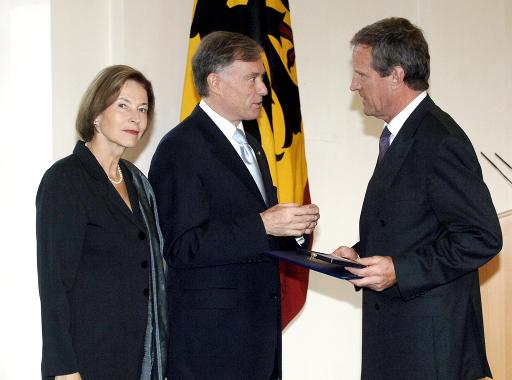Frank Steglich Personal Page

|
Frank Steglich
Director Qiushi Distinguished Professor
E-mail: steglich at cpfs.mpg.de
CLICK HERE to view the Curriculum Vitae of Prof. Steglich |
Prof. Steglich studied Physics at the Universities of Münster (Germany) and Göttingen (Germany) from 1960 to 1966 and obtained the academic degree “Diplom-Physiker” in 1966. Subsequently he worked on his Doctoral Thesis devoted to the heat conduction in highly disordered metal films, supervised by R. Hilsch, and received the title “Dr. rer. nat.” in Göttingen in 1969. He then moved to the University of Köln (Germany) where he assisted G. von Minnigerode (and after 1973 his successor D. Wohlleben) with the expansion of the Institute of Applied Physics. In 1976 he submitted a Habilitation Thesis on the thermal properties of the exemplary Kondo alloy La1-xCexAl2 and became a “Privatdozent” (Lecturer). Two years later, he was appointed Associate Professor at the Institute of Experimental Physics and in 1980 Full Professor at the Institute of Technical Physics, Technical University of Darmstadt (Germany). In 1996 he became Founding Director of the Max Planck Institute for Chemical Physics of Solids (MPI CPfS), Dresden (Germany), where he led the Department of Solid – State Physics until his retirement in 2012. In the same year, Prof. Steglich became the Founding Director of the Center for Correlated Matter and was appointed as a Qiushi Distinguished Visiting Professor in Zhejiang University, China.
He held the position of the Secretary of the IUAP Commission C9 “Magnetism” from 1987 to 1990 and that of the Managing Editor of Z. Physik B, Condensed Matter Physics, from 1987 to 1996. He served as a Member of the Board of Governors of the Institute of Solid State and Materials Research, Dresden, from 2000 to 2007, as a Vice President of the German Research Foundation (Deutsche Forschungsgemeinschaft, DFG) from 2001 to 2007, as a Member of the Board of Governors of the German Israel Foundation from 2002 to 2007, of the External Advisory Committee of the National High Magnetic Field Laboratory at Florida State University, Tallahassee (USA), from 2003 to 2008 and of the Advisory Committee of the Institute for Quantum Matter at Johns Hopkins University, Baltimore (USA), 2010. In 2003, he was a Member of the International Advisory Board to the Institute for Materials Research, Tohoku University, Sendai (Japan). He has been Chairman of the Scientific Advisory Board to the Center for Electronic Correlations and Magnetism, University of Augsburg (Germany) since 2006 and Member of the Board of Trustees of the Center for Science & Research Management, Speyer (Germany), from 2008 to 2013 as well as of the Rice Center for Quantum Materials, Rice University, Houston (USA), since 2014.
Prof. Steglich has broad research interests. During his career, he has made significant contributions to disorder phenomena, local magnetic moments in metals, Kondo alloys and valence fluctuating systems, Kondo lattice systems, heavy fermion superconductivity, quantum criticality and correlated thermoelectricity. In 1979, he discovered the first unconventional superconductor, the heavy fermion superconductor CeCu2Si2, which pioneered a new research field and has had a strong impact on many aspects of physics. By the beginning of 2015, he has published more than 840 articles in refereed journals and books, among which 6 articles were published in Nature, 4 in Science, 3 in Nature Physics, 1 in Nature Materials, 4 in PNAS and 73 in Physical Review Letters. The total citation of his publications is over 20000 times, with an h-index of 66.

Mr. Horst Koehler, the President of Germany, and his wife present the order of merit (“Bundesverdienstkreuz”) to Prof. Steglich in 2005.
Prof. Steglich was awarded an Academy Stipend of the VW Foundation (1985), the Gottfried Wilhelm Leibniz Prize of the DFG (1986), the Hewlett Packard Europhysics Prize of the European Physical Society (1989), the Alexander von Humboldt Award for the Promotion of the Scientific Cooperation with France (Gay Lussac Humboldt Prize, 1989), the American Physical Society International Prize for New Materials (James C. McGroddy Prize, 1990), the International Union for Pure and Applied Physics (IUPAP) Award for Magnetism (2000), the Stern Gerlach Medal of the German Physical Society in 2004 as well as the Bernd T. Matthias Prize for Superconducting Materials in 2006. He received an Honorary Professorship from the W. Trzebiatowski Institute of Low Temperature and Structure Research, Polish Academy of Sciences, Wrocław (1996), Honorary Doctorates from the Universities of Augsburg (2000), Köln (2005), Frankfurt/Main (2005), and the Jagiellionian University Krakow, Poland (2008), as well as the Order of Merit of the Federal Republic of Germany (“Das Große Verdienstkreuz des Verdienstordens der Bundesrepublik Deutschland”, 2005). He became a Member of the Convent for Technical Sciences (acatech) (2002), a Corresponding Member of the Academy of Sciences of Göttingen (1999) as well as of the Academy of Sciences of Saxony, Leipzig (1999), and a Foreign Member of the Polish Academy of Sciences (2010).



